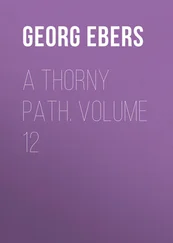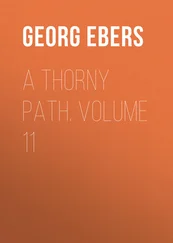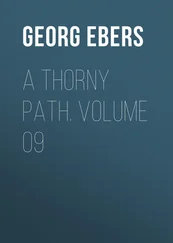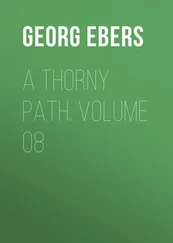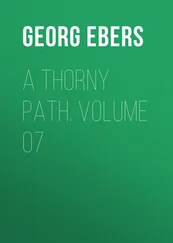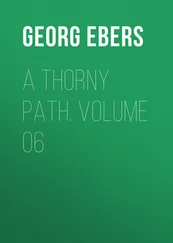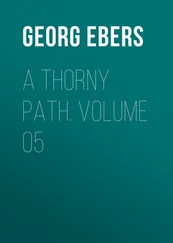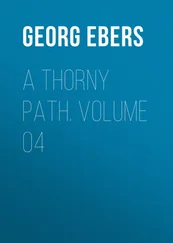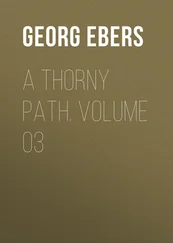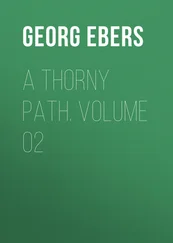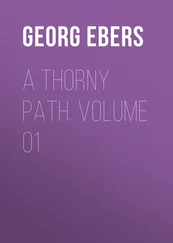Georg Ebers - A Thorny Path. Complete
Здесь есть возможность читать онлайн «Georg Ebers - A Thorny Path. Complete» — ознакомительный отрывок электронной книги совершенно бесплатно, а после прочтения отрывка купить полную версию. В некоторых случаях можно слушать аудио, скачать через торрент в формате fb2 и присутствует краткое содержание. Жанр: foreign_prose, История, foreign_edu, foreign_antique, на английском языке. Описание произведения, (предисловие) а так же отзывы посетителей доступны на портале библиотеки ЛибКат.
- Название:A Thorny Path. Complete
- Автор:
- Жанр:
- Год:неизвестен
- ISBN:нет данных
- Рейтинг книги:5 / 5. Голосов: 1
-
Избранное:Добавить в избранное
- Отзывы:
-
Ваша оценка:
- 100
- 1
- 2
- 3
- 4
- 5
A Thorny Path. Complete: краткое содержание, описание и аннотация
Предлагаем к чтению аннотацию, описание, краткое содержание или предисловие (зависит от того, что написал сам автор книги «A Thorny Path. Complete»). Если вы не нашли необходимую информацию о книге — напишите в комментариях, мы постараемся отыскать её.
A Thorny Path. Complete — читать онлайн ознакомительный отрывок
Ниже представлен текст книги, разбитый по страницам. Система сохранения места последней прочитанной страницы, позволяет с удобством читать онлайн бесплатно книгу «A Thorny Path. Complete», без необходимости каждый раз заново искать на чём Вы остановились. Поставьте закладку, и сможете в любой момент перейти на страницу, на которой закончили чтение.
Интервал:
Закладка:
In Alexandria there were altars to every god, and worship in every form. Hers, however, was not among them, for the genius of her creed was the enfranchised soul of her mother, who had cast off the burden of this perishable body. Nothing had ever come from her that was not good and lovely; and she knew that if her mother were permitted, even in some other than human form, she would never cease to watch over her with tender care.
And those initiated into the Eleusinian mysteries, as Diodoros had told her, desired the immortality of the soul, to the end that they might continue to participate in the life of those whom they had left behind. What was it that brought such multitudes at this time out to the Nekropolis, with their hands full of offerings, but the consciousness of their nearness to the dead, and of being cared for by them so long as they were not forgotten? And even if the glorified spirit of her mother were not permitted to hear her prayers, she need not therefore cease to turn to her; for it comforted her unspeakably to be with her in spirit, and to confide to her all that moved her soul. And so her mother’s tomb had become her favorite place of rest. Here, if anywhere, she now hoped once more to find comfort, some happy suggestion, and perhaps some definite assistance.
She begged Alexander to take her thither, and he consented, though he was of opinion that Philip would be found in the mortuary chamber, in the presence of Korinna’s portrait.
It was not easy to force their way through the thousands who had come out to the great show this night; however, most of the visitors were attracted by the mysteries far away from the Macedonian burial-ground, and there was little to disturb the silence near the fine marble monument which Alexander, to gratify his father, had erected with his first large earnings. It was hung with various garlands, and Melissa, before she prayed and anointed the stone, examined them with eye and hand.
Those which she and her father had placed there she recognized at once. That humble garland of reeds with two lotus-flowers was the gift of their old slave Argutis and his wife Dido. This beautiful wreath of choice flowers had come from the garden of a neighbor who had loved her mother well; and that splendid basketful of lovely roses, which had not been there this morning, had been placed here by Andreas, steward to the father of her young friend Diodoros, although he was of the Christian sect. And these were all. Philip had not been here then, though it was now past midnight.
For the first time in his life he had let this day pass by without a thought for their dead. How bitterly this grieved Melissa, and even added to her anxiety for him!
It was with a heavy heart that she and Alexander anointed the tombstone; and while Melissa uplifted her hands in prayer, the painter stood in silence, his eyes fixed on the ground. But no sooner had she let them fall, than he exclaimed:
“He is here, I am sure, and in the house of the embalmers. That he ordered two wreaths is perfectly certain; and if he meant one for Korinna’s picture, he surely intended the other for our mother. If he has offered both to the young girl—”
“No, no!” Melissa put in. “He will bring his gift. Let us wait here a little while, and do you, too, pray to the manes of our mother. Do it to please me.”
But her brother interrupted her eagerly: “I think of her wherever I may be; for those we truly love always live for us. Not a day passes, nor if I come in sober, not a night, when I do not see her dear face, either waking or dreaming. Of all things sacred, the thought of her is the highest; and if she had been raised to divine honors like the dead Caesars who have brought so many curses on the world—”
“Hush—don’t speak so loud!” said Melissa, seriously, for men were moving to and fro among the tombs, and Roman guards kept watch over the populace.
But the rash youth went on in the same tone:
“I would worship her gladly, though I have forgotten how to pray. For who can tell here—unless he follows the herd and worships Serapis—who can tell to which god of them all he shall turn when he happens to be at his wits’ end? While my mother lived, I, like you, could gladly worship and sacrifice to the immortals; but Philip has spoiled me for all that. As to the divine Caesars, every one thinks as I do. My mother would sooner have entered a pesthouse than the banqueting-hall where they feast, on Olympus. Caracalla among the gods! Why, Father Zeus cast his son Hephaistos on earth from the height of Olympus, and only broke his leg; but our Caesar accomplished a more powerful throw, for he cast his brother through the earth into the nether world—an imperial thrust—and not merely lamed him but killed him.”
“Well done!” said a deep voice, interrupting the young artist. “Is that you, Alexander? Hear what new titles to fame Heron’s son can find for the imperial guest who is to arrive to-morrow.”
“Pray hush!” Melissa besought him, looking up at the bearded man who had laid his arm on Alexander’s shoulder. It was Glaukias the sculptor, her father’s tenant; for his work-room stood on the plot of ground by the garden of Hermes, which the gem-cutter had inherited from his father-in-law.
The man’s bold, manly features were flushed with wine and revelry; his twinkling eyes sparkled, and the ivy-leaves still clinging to his curly hair showed that he had been one in the Dionysiac revellers; but the Greek blood which ran in his veins preserved his grace even in drunkenness. He bowed gayly to the young girl, and exclaimed to his companions:
“The youngest pearl in Alexandria’s crown of beauties!” while Bion, Alexander’s now gray-haired master, clapped the youth on the arm, and added: “Yes, indeed, see what the little thing has grown! Do you remember, pretty one, how you once—how many years ago, I wonder?—spotted your little white garments all over with red dots! I can see you now, your tiny finger plunged into the pot of paint, and then carefully printing off the round pattern all over the white linen. Why, the little painter has become a Hebe, a Charis, or, better still, a sweetly dreaming Psyche.”
“Ay, ay!” said Glaukias again. “My worthy landlord has a charming model. He has not far to seek for a head for his best gems. His son, a Helios, or the great Macedonian whose name he bears; his daughter—you are right, Bion—the maid beloved of Eros. Now, if you can make verses, my young friend of the Muses, give us an epigram in a line or two which we may bear in mind as a compliment to our imperial visitor.”
“But not here—not in the burial-ground,” Melissa urged once more.
Among Glaukias’s companions was Argeios, a vain and handsome young poet, with scented locks betraying him from afar, who was fain to display the promptness of his poetical powers; and, even while the elder artist was speaking, he had run Alexander’s satirical remarks into the mold of rhythm. Not to save his life could he have suppressed the hastily conceived distich, or have let slip such a justifiable claim to applause. So, without heeding Melissa’s remonstrance, he flung his sky-blue mantle about him in fresh folds, and declaimed with comical emphasis:
“Down to earth did the god cast his son: but with mightier hand
Through it, to Hades, Caesar flung his brother the dwarf.”
The versifier was rewarded by a shout of laughter, and, spurred by the approval of his friends, he declared he had hit on the mode to which to sing his lines, as he did in a fine, full voice.
But there was another poet, Mentor, also of the party, and as he could not be happy under his rival’s triumph, he exclaimed: “The great dyer—for you know he uses blood instead of the Tyrian shell—has nothing of Father Zeus about him that I can see, but far more of the great Alexander, whose mausoleum he is to visit to-morrow. And if you would like to know wherein the son of Severus resembles the giant of Macedon, you shall hear.”
Читать дальшеИнтервал:
Закладка:
Похожие книги на «A Thorny Path. Complete»
Представляем Вашему вниманию похожие книги на «A Thorny Path. Complete» списком для выбора. Мы отобрали схожую по названию и смыслу литературу в надежде предоставить читателям больше вариантов отыскать новые, интересные, ещё непрочитанные произведения.
Обсуждение, отзывы о книге «A Thorny Path. Complete» и просто собственные мнения читателей. Оставьте ваши комментарии, напишите, что Вы думаете о произведении, его смысле или главных героях. Укажите что конкретно понравилось, а что нет, и почему Вы так считаете.

